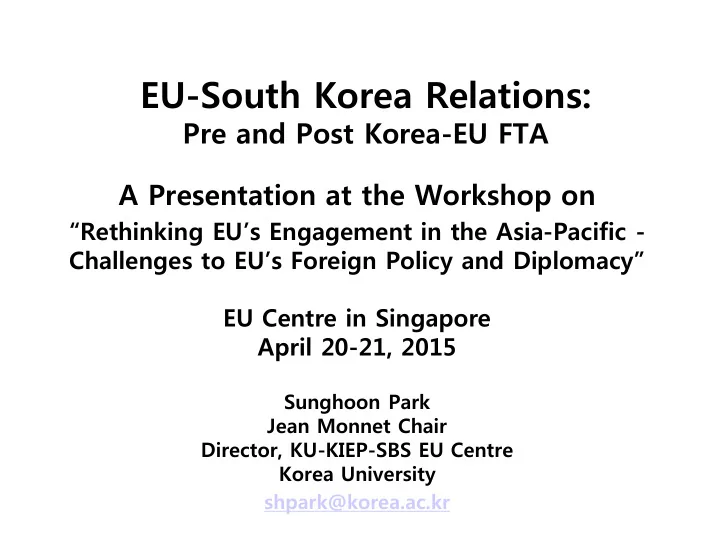

EU-South Korea Relations: Pre and Post Korea-EU FTA A Presentation at the Workshop on “Rethinking EU’s Engagement in the Asia-Pacific - Challenges to EU’s Foreign Policy and Diplomacy” EU Centre in Singapore April 20-21, 2015 Sunghoon Park Jean Monnet Chair Director, KU-KIEP-SBS EU Centre Korea University shpark@korea.ac.kr
Background • More Active EU’s Engagement with the Asia-Pacific since Early 1990s – Uruguay Round Negotiations till 1994 – Single Market Programme till 1993 • EU’s Asia Strategy Includes Four Sub-regions – Northeast Asia: China, Japan, Korea – Southeast Asia: ASEAN – South Asia: India, Pakistan, Bangladesh, Sri Lanka – Australasia: Australia, New Zealand
Background • Deepening of EU’s (New) Asia Strategy – 1994: NAS Newly Launched – 2001: Upgrade of Asia Strategy – 2003: European Security Strategy • 2007 Update and yearly Performance Check – 2006: ‘Global Europe’ Strategy • New FTA Strategy of the EU with Many Asian Negotiation Partners (Korea, ASEAN, etc.) – 2012: “Asia Year” Concept Paper ASEM as a Venue for Bilateral Cooperation • Korea Enjoying a Unique Status
Trajectory of Korea-EU Relations • Incremental Advancements of EU’s Approach towards Korea – 1993: Adoption of Korea Strategy Paper • NAS (1994) China (1995) Japan (1995) ASEAN (1996) • Launch of ASEM (1996) – 2001: First Framework Agreement – 2007-2009: Negotiations on an FTA (Initialed in 2009, Signed in 2010) – 2010: Framework Agreement (Korea One of EU’s Ten Strategic Partners) – 2011: Entry into Force of the Korea-EU FTA – 2014: Adoption of Agreement on Participation in Crisis Management Operations
Korea’s Unique Status • Korea as the Only Country in the World with 3 Major Cooperation Agreements with the EU – Framework Agreement (2010) – Free Trade Agreement (2011) – Agreement on Crisis Management Operations (2014) • Korea and the EU in Search of New Cooperation Agenda – Cultural Cooperation (Committee Established) – Cooperation in Science and Technology (FP7 and FP8) – Cooperation in International Development Activities • Korea’s DAC Membership in 2010 • Framework Agreement (2010) and Summit Meetings (2012)
Korea’s Unique Status • Education also an Important Field of Cooperation – ASEMDUO Fellowship Program – ECP-ICI between the EU and Korea • EU Centre Programs with Strong Impacts – 5 EU Centres in Korea (4 in Japan) – Subject to Major Changes for Coming Years
Future Agenda for Korea-EU Bilateral Cooperation • Stronger Trilateral Cooperation in International Development Desirable – Combining Respective Expertise • Korea in Asia to Combine with the EU in Africa and Latin America • Green Growth and Technology (GGGI, GCF) • Technical and Vocational Education and Training • Trade Promotion and Related HRD • Potential for Security-related Fields to be Explored Further – EU More Neutral than the US in Dealing with North Korea
Future Agenda for Korea-EU Bilateral Cooperation • More Meaningful Lessons to be Drawn for NEA Reconciliation – Franco-German Leadership Cooperation in European Integration – Germany-Poland Reconciliation Process Providing Meaningful Lessons for Resolving Disputes between China-Japan-Korea – Korea Well-positioned to Play the Role of an (Inter)Mediator • between China and Japan • between Developed and Deveoloing Asia
Thank You Very Much!
Recommend
More recommend